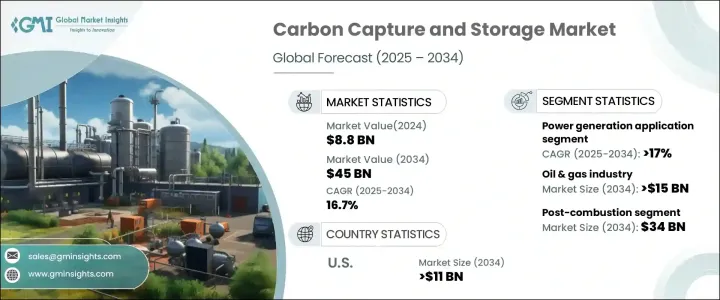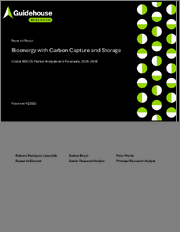
|
시장보고서
상품코드
1699282
탄소 포집 및 저장(CCS) 시장 : 시장 기회, 성장 촉진요인, 산업 동향 분석, 예측(2025-2034년)Carbon Capture and Storage Market Opportunity, Growth Drivers, Industry Trend Analysis, and Forecast 2025-2034 |
||||||
세계의 탄소 포집 및 저장 시장의 2024년 시장 규모는 88억 달러로 평가되었고, 2025-2034년 16.7%의 연평균 복합 성장률(CAGR)로 성장할 것으로 예측되고 있습니다.
온실가스의 배출을 억제하고 탈탄소화 목표를 달성하는 긴급성이 높아지고 있는 것이 CCS 기술에 대한 큰 투자를 촉진하고 있습니다. 세계 각국 정부는 엄격한 환경 규제를 실시하고 있으며, 산업계는 컴플라이언스 기준을 충족하고 이산화탄소 배출량을 줄이기 위해 선진적인 탄소 회수 솔루션을 도입해야 합니다. 기후변화에 대한 우려의 고조는 급속한 산업 확대 및 에너지 수요와 맞물려 비용 대비 효과가 높은 배출 억제 기술의 필요성을 더욱 높이고 있습니다.

에너지, 화학 및 제조 분야의 기업들은 세계의 지속가능성 이니셔티브에 따라 CCS 솔루션을 적극적으로 사업에 통합하고 있습니다. 클린 에너지로의 이행에 대한 주목의 고조는, 탄소 포집 효율의 진보와 맞물려, 시장 확대의 새로운 기회를 이끌어 내고 있습니다. 나아가 연구개발 활동의 활발화가 확장성 및 운용 가능성을 높이는 차세대 CCS 기술의 혁신을 촉진하고 있습니다. 산업계가 환경에 대한 책임과 경제성장의 양립을 목표로 하는 가운데, CCS는 장기적인 탄소 뉴트럴 달성을 위한 지극히 중요한 솔루션으로서 대두되고 있습니다.
| 시장 범위 | |
|---|---|
| 시작 연도 | 2024년 |
| 예측 연도 | 2025-2034년 |
| 시작 금액 | 88억 달러 |
| 예측 금액 | 450억 달러 |
| CAGR | 16.7% |
시장은 기술에 따라 연소 전, 산소 연소, 연소 후로 구분됩니다. 연소 후 포집 기술은 상당한 성장이 예상되며, 2034년까지 340억 달러에 달할 것으로 예측됩니다. 이 기술은 기존 산업 설비와의 원활한 통합을 통해 발전소, 정유소 및 제조 시설에서 대규모 채택을 가능하게 하고 지지를 모으고 있습니다. 배기가스 규제가 우선 과제가 되고 있는 가운데, 연소 후 시스템은 효율과 비용 효과를 높여 진화하고 있어, 실행 가능한 탄소 삭감 전략을 요구하는 산업에 있어서 매력적인 선택지가 되고 있습니다. 혁신적인 흡수제와 첨단 여과 기술의 개발은 연소 후 기술의 성능과 채택을 더욱 향상시켜 일관된 시장 확대를 보장합니다.
용도별로 시장은 발전, 화학처리, 석유 및 가스 등의 산업에 걸쳐 있습니다. 발전 분야는 2024년에 36%의 점유율을 획득했으며, 2034년까지 17%의 연평균 복합 성장률(CAGR)로 성장할 것으로 예상됩니다. 수소의 생산, 저장, 유통을 촉진하는 CCS 인프라의 도입이 증가하고 있는 것은 이 분야에서 수요를 촉진하는 중요한 요인입니다. 세계 에너지 소비 증가가 계속되고 있는 가운데 정부와 유틸리티자들은 에너지 생산량을 손상시키지 않고 배출량 목표를 달성하기 위해 CCS 도입을 우선하고 있습니다. 발전소는 CCS 솔루션을 활용하여 기존의 에너지 시스템을 개수하고 운전 효율을 유지하면서 엄격한 환경 정책에 대한 컴플라이언스를 확보하고 있습니다. 신재생 에너지 프로젝트 및 카본 마이너스 이니셔티브에서의 CCS의 통합은 진화하는 에너지 상황에서 CCS의 역할을 더욱 확고하게 하고 있습니다.
미국 시장은 2024년에 33억 달러를 창출하였고, 2034년에는 110억 달러에 이를 것으로 예측됩니다. 이산화탄소 배출량의 감소와 에너지 인프라의 현대화를 중시하는 국가의 자세가 CCS 투자를 가속화하고 있습니다. 배출 제어 시스템의 기술적 진보는 대규모 CCS 프로젝트에 대한 엄청난 자금 조달과 함께 국가 전체 시장 성장을 이끌고 있습니다. 북미는 여전히 CCS 확장의 주요 지역이며 전략적 파트너십과 정부 인센티브가 기술 혁신과 전개 촉진에 중요한 역할을 하고 있습니다. 산업계가 보다 깨끗한 생산방법을 추구하는 가운데 미국 시장은 강력한 성장을 이루며 세계 CCS 상황에서 리더십을 강화할 것으로 보입니다.
목차
제1장 조사 방법 및 조사 범위
- 시장 범위 및 정의
- 시장 추계 및 예측 파라미터
- 예측 계산
- 데이터 소스
제2장 주요 요약
제3장 업계 인사이트
- 생태계 분석
- 규제 상황
- 업계에 미치는 영향요인
- 성장 촉진요인
- 업계의 잠재적 위험 및 과제
- 성장 가능성 분석
- Porter's Five Forces 분석
- PESTEL 분석
제4장 경쟁 구도
- 서문
- 전략적 전망
- 혁신 및 지속가능성의 전망
제5장 시장 규모 및 예측 : 기술별(2021-2034년)
- 주요 동향
- 연소 전
- 연소 후
- 산소 연소
제6장 시장 규모 및 예측 : 용도별(2021-2034년)
- 주요 동향
- 석유 및 가스
- 화학처리
- 발전
- 기타
제7장 시장 규모 및 예측 : 지역별(2021-2034년)
- 주요 동향
- 북미
- 미국
- 캐나다
- 유럽
- 영국
- 독일
- 덴마크
- 스웨덴
- 아시아태평양
- 중국
- 호주
- 한국
- 세계 기타 지역
제8장 기업 프로파일
- Air Products
- Aker Solutions
- Carbon Clean
- Chevron
- Dakota Gasification Company
- Equinor
- Exxon Mobil
- Fluor
- General Electric
- Halliburton
- Linde
- Mitsubishi Heavy Industries
- NRG Energy
- Shell Cansolv
- Siemens
- SLB
- Sulzer
- TotalEnergies
The Global Carbon Capture And Storage Market was valued at USD 8.8 billion in 2024 and is projected to grow at a CAGR of 16.7% between 2025 and 2034. The increasing urgency to curb greenhouse gas emissions and achieve decarbonization goals is driving significant investments in CCS technologies. Governments worldwide are implementing stringent environmental regulations, compelling industries to adopt advanced carbon capture solutions to meet compliance standards and mitigate their carbon footprint. Rising concerns over climate change, combined with the rapid industrial expansion and energy demands, are further propelling the need for cost-effective emission control technologies.

Companies across the energy, chemical, and manufacturing sectors are actively integrating CCS solutions into their operations to align with global sustainability initiatives. The growing focus on clean energy transition, coupled with advancements in carbon capture efficiency, is unlocking new opportunities for market expansion. Additionally, increasing research and development activities are fostering the innovation of next-generation CCS technologies that enhance scalability and operational feasibility. As industries strive to balance environmental responsibility with economic growth, CCS is emerging as a pivotal solution for achieving long-term carbon neutrality.
| Market Scope | |
|---|---|
| Start Year | 2024 |
| Forecast Year | 2025-2034 |
| Start Value | $8.8 Billion |
| Forecast Value | $45 Billion |
| CAGR | 16.7% |
The market is segmented based on technology into pre-combustion, oxy-fuel combustion, and post-combustion. Post-combustion capture technology is expected to witness substantial growth, with forecasts indicating it will reach USD 34 billion by 2034. This technology is gaining traction due to its seamless integration with existing industrial setups, enabling large-scale adoption across power plants, refineries, and manufacturing facilities. As emission control becomes a priority, post-combustion systems are evolving with enhanced efficiency and cost-effectiveness, making them an attractive option for industries seeking viable carbon reduction strategies. The development of innovative absorbents and advanced filtration techniques is further boosting the performance and adoption of post-combustion technology, ensuring consistent market expansion.
In terms of application, the market spans power generation, chemical processing, and oil & gas, among other industries. The power generation segment captured a 36% share in 2024 and is expected to grow at a CAGR of 17% through 2034. The increasing deployment of CCS infrastructure to facilitate hydrogen production, storage, and distribution is a crucial factor fueling demand within this sector. As global energy consumption continues to rise, governments and utility providers are prioritizing CCS adoption to meet emission targets without compromising energy output. Power plants are leveraging CCS solutions to retrofit conventional energy systems, ensuring compliance with strict environmental policies while maintaining operational efficiency. The integration of CCS in renewable energy projects and carbon-negative initiatives is further solidifying its role in the evolving energy landscape.
The U.S. market generated USD 3.3 billion in 2024 and is projected to reach USD 11 billion by 2034. The nation's emphasis on reducing carbon emissions and modernizing energy infrastructure is accelerating CCS investments. Technological advancements in emission control systems, coupled with substantial funding for large-scale CCS projects, are driving market growth across the country. North America remains a key region for CCS expansion, with strategic partnerships and government incentives playing a vital role in fostering innovation and deployment. As industries strive for cleaner production methods, the U.S. market is set to experience robust growth, reinforcing its leadership in the global CCS landscape.
Table of Contents
Chapter 1 Methodology & Scope
- 1.1 Market scope & definitions
- 1.2 Market estimates & forecast parameters
- 1.3 Forecast calculation
- 1.4 Data sources
- 1.4.1 Primary
- 1.4.2 Secondary
- 1.4.2.1 Paid
- 1.4.2.2 Public
Chapter 2 Executive Summary
- 2.1 Industry synopsis, 2021 - 2034
Chapter 3 Industry Insights
- 3.1 Industry ecosystem analysis
- 3.2 Regulatory landscape
- 3.3 Industry impact forces
- 3.3.1 Growth drivers
- 3.3.2 Industry pitfalls & challenges
- 3.4 Growth potential analysis
- 3.5 Porter's analysis
- 3.5.1 Bargaining power of suppliers
- 3.5.2 Bargaining power of buyers
- 3.5.3 Threat of new entrants
- 3.5.4 Threat of substitutes
- 3.6 PESTEL analysis
Chapter 4 Competitive Landscape, 2024
- 4.1 Introduction
- 4.2 Strategic outlook
- 4.3 Innovation & sustainability landscape
Chapter 5 Market Size and Forecast, By Technology, 2021 – 2034 (MTPA, USD Billion)
- 5.1 Key trends
- 5.2 Pre combustion
- 5.3 Post combustion
- 5.4 Oxy-Fuel combustion
Chapter 6 Market Size and Forecast, By Application, 2021 – 2034 (MTPA, USD Billion)
- 6.1 Key trends
- 6.2 Oil and gas
- 6.3 Chemical processing
- 6.4 Power generation
- 6.5 Others
Chapter 7 Market Size and Forecast, By Region, 2021 – 2034 (MTPA, USD Billion)
- 7.1 Key trends
- 7.2 North America
- 7.2.1 U.S.
- 7.2.2 Canada
- 7.3 Europe
- 7.3.1 UK
- 7.3.2 Germany
- 7.3.3 Denmark
- 7.3.4 Sweden
- 7.4 Asia Pacific
- 7.4.1 China
- 7.4.2 Australia
- 7.4.3 South Korea
- 7.5 Rest of World
Chapter 8 Company Profiles
- 8.1 Air Products
- 8.2 Aker Solutions
- 8.3 Carbon Clean
- 8.4 Chevron
- 8.5 Dakota Gasification Company
- 8.6 Equinor
- 8.7 Exxon Mobil
- 8.8 Fluor
- 8.9 General Electric
- 8.10 Halliburton
- 8.11 Linde
- 8.12 Mitsubishi Heavy Industries
- 8.13 NRG Energy
- 8.14 Shell Cansolv
- 8.15 Siemens
- 8.16 SLB
- 8.17 Sulzer
- 8.18 TotalEnergies



















